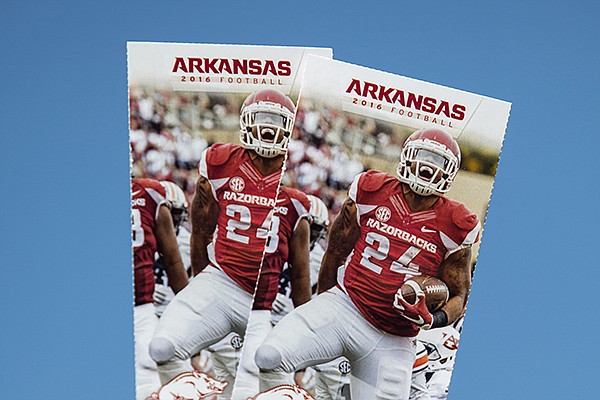FAYETTEVILLE — The next two weeks will run the gamut of interest in Arkansas football games.
This weekend’s 11 a.m. game against Alcorn State in Little Rock will draw little interest outside of diehard fans. About 40,000 tickets will be sold and somewhere in the neighborhood of 100,000 will watch from home.
Next week’s primetime game against Alabama has been a sellout for weeks and millions will tune in on TV.
Single-game tickets for the Alcorn State game sold for $35 (in the end zones) to $45 at War Memorial Stadium. Single-game tickets for Alabama were $85 in the lower level and $65 for the upper level.
Such a disparity has never existed for Arkansas games, and yet the gap between the prices isn’t near wide enough, according to one of the national leaders in ticket research.
University of North Carolina professor Nels Popp says colleges still have a ways to go before mastering ticket dynamics.
“From a broad perspective, what’s really happening is that games are incorrectly priced from an economic standpoint,” Popp said. “That Alabama game and that LSU game is probably worth more than Arkansas is selling it for originally. Even though that ticket is priced pretty high, the market will say we’ll pay more.
“I’ll give you an example: here at North Carolina, the cheapest ticket sold to the Duke basketball game is $107. That seems very high, but the reality is people would pay $250 for that. Technically we should be selling that for more. But when UNC plays East Carolina, they sell that ticket for $50 and it should probably be $20. Football really highlights that.”
Prior to 2016, the most expensive non-club or suite ticket in Fayetteville was $65 — for the Auburn game last season. A non-end zone ticket for the Toledo game in Little Rock last season went for $55.
Before that, pricing for Fayetteville and Little Rock games was even more simplified: $55 per SEC game in Fayetteville; $65 for Little Rock. Drop $10 and you had the nonconference prices at each stadium.
The $10 difference between the stadiums reflected the lost revenue the Razorbacks incurred by playing in Little Rock, where they pay a rental fee each game.
Arkansas — like many other athletics programs — has began to take more risks in selling tickets. Earlier this year, the Razorbacks introduced a ticket buyback program that will pay season ticket holders up to face value for their unwanted tickets to SEC games. Arkansas will then resell the tickets for market value, which fluctuates based on the performance of the teams.
In the summer 2012, Arkansas and Alabama were in the top 10 and market value for their early-season game in Fayetteville was in the hundreds of dollars per ticket. After the Razorbacks lost to ULM, tickets were basically given away to the game against the Crimson Tide the following week.
“I think ideally (reselling tickets) is meant to be a purely capitalistic enterprise where supply and demand meet, and that should establish what the price is,” Popp said.
The Razorbacks have become more willing to compromise on prices. Not only did Arkansas offer Alcorn State tickets for $10 less in each section than the Toledo game a year ago, it has also reduced value for the upper level seats for some Fayetteville games.
Fans reported paying $10 per ticket for the Texas State game. The result was a legitimate sellout and attendance of 72,114 — unheard of since stadium renovation for a non-power team.
While the Alabama and LSU games neared sellouts during the summer, sales for SEC games against Ole Miss and Florida didn’t fare as well. So following the Razorbacks’ win over TCU, the program offered a flash sale for those games — $41 per ticket to celebrate the team’s 41-38 win.
Both games are now likely to sell out, too. While a smart marketing strategy, Popp says it is still risky business for enterprises that rely so much on season ticket sales and private donations from alumni.
“I think pro sports are much more willing to examine this and take those huge swings because they are revenue-driven,” Popp said, “whereas college athletic departments want revenue, but they also have to be concerned about public image.”
Arkansas is taking baby steps toward being a more dynamic player in the ticket market. For now, fans are still getting a deal, whether their wallet believes it or not.
CORRECTION: A previous version of this story incorrectly stated upper level seats for the Alabama game were sold for $85. That mistakes has been corrected.
This story originally appeared in Hawgs Illustrated

